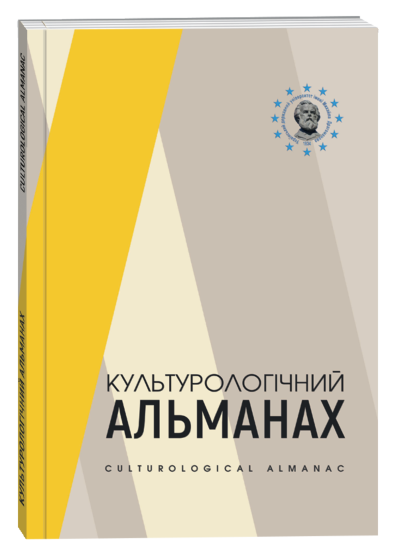THOMISM AND THE SIXTEENTH-CENTURY REFORMATION: A CONTROVERSIAL HISTORY OF REJECTION AND ACCEPTANCE
DOI:
https://doi.org/10.31392/cult.alm.2023.2.4Keywords:
scholasticism, reform, Protestantism, Zwingli, Calvin, Luther.Abstract
The article analyzes the degree of influence of the Thomistic scholastic tradition on the leading carriers of reformation ideas in the beginning of the 16th century (Martin Luther, John Calvin, and Ulrich Zwingli), as well as on the movement of European Reformation as a whole. In the process of making this research, the author found out that the initial stage of the Reformation was marked by the emergence of several independent movements with distinct theological accents and unequal attitudes to the philosophical tradition that had been started by St. Thomas Aquinas. First of all, being brought up as late medieval Catholics, the founding fathers of the Reformation encountered a plurality of trends within the scholastic thought tradition (Thomism, Albertism, Scotism, Occamism, Augustinianism) which negatively affected their reception of medieval scholasticism, as well as their desire to use the work of scholastic thinkers in their own theological programs. It was found that at the early stage of his intellectual formation, H. Zwingli was significantly influenced by St. Augustine, John Duns Scotus and the humanist Erasmus of Rotterdam, but the works of St. Thomas did not significantly influence the Zurich reformer’s ideas. Modern researchers interpret the absence of direct references to the scholastics’ treatises in the works of J. Calvin as a disguised reluctance of the Genevan initiator of the Reformation to reveal his dependence on them for polemical reasons. However, some theologians prefer to talk about the dual contradictory personality of Calvin, who combined: 1) a philosophical crypto-Thomist with rationalist inclinations and a desire for order, structure and systematization, as well as 2) a theologian with an understanding of Christianity as a living, dynamic religion. M. Luther was distinguished by his sharp public attacks on the philosophy of Aquinas. However, in the private letters of the German reformer the reliable evidence was found about Luther’s selective private study of the philosophy of St. Thomas. Finally, it should be noted that at the turn of the 16th and 17th centuries, an authentic and unique intellectual phenomenon emerged, which went down in history under the name «Protestant scholasticism». The reason for the appearance of this thought tradition was the introduction and subsequent fixation of Protestant theology in a number of European universities.
References
Bagchi D., Steinmetz D. C. (Eds.). (2004). The Cambridge Companion to Reformation Theology. Cambridge and New York: Cambridge University Press. x + 289 p.
Bouwsma W. J. (1988). John Calvin: A Sixteenth Century Portrait. New York: Oxford University Press. viii + 310 p.
Cottret B. (2000). Calvin: A Biography. Grand Rapids, MI: Eerdmans; Edinburgh, Scotland: T&T Clark. xv + 376 p.
Dieter T. (2017). Martin Luther and Scholasticism. In D. Marmion, S. Ryan, and G. E. Thiessen (Eds.), Remembering the Reformation: Martin Luther and Catholic Theology. Minneapolis: Fortress Press. P. 55–74.
Hendrix S. (2004). Luther. In D. Bagchi and D. C. Steinmetz (Eds.), The Cambridge Companion to Reformation Theology. Cambridge and New York: Cambridge University Press. P. 39–56.
Janz D. R. (2004). Late medieval theology. In D. Bagchi and D. C. Steinmetz (Eds.), The Cambridge Companion to Reformation Theology. Cambridge and New York: Cambridge University Press. P. 5–14.
Kolb R. (2004). Confessional Lutheran theology. In D. Bagchi and D. C. Steinmetz (Eds.), The Cambridge Companion to Reformation Theology. Cambridge and New York: Cambridge University Press. P. 68–79.
Luther M. D. (1888). Martin Luthers Werke. Kritische Gesamtausgabe. Band 6. Weimar: Böhlau. vi + 632 s.
Luther M. D. (1899). Martin Luthers Werke. Kritische Gesamtausgabe. Band 15: Widder den newen Abgott. Weimar: Böhlau. viii + 822 s.
Luther M. (1908). The Letters of Martin Luther. London: Macmillan. xxxv + 482 p.
McGinn B. (2014). Thomas Aquinas’s Summa theologiae: A Biography. Princeton, NJ: Princeton University Press. xi + 260 p.
McGrath A. (2007). Christianity’s Dangerous Idea: The Protestant Revolution: A History from the Sixteenth Century to the Twenty-First. New York, NY: Harper Collins. vi + 552 p.
McGrath A. (2004). The Intellectual Origins of the European Reformation. Oxford: Blackwell. x + 289 p.
Muller R. A. (2017). Calvinist Thomism Revisited: William Ames (1576–1633) and the Divine Ideas. In K. M. Comerford, G. W. Jenkins, W. J. T. Kirby (Eds.), From Rome to Zurich, between Ignatius and Vermigli: Essays in Honor of John Patrick Donnelly, SJ. Leiden and Boston: Brill. P. 103–120.
Plantinga A. (2000). Warranted Christian Belief. Oxford; New York: Oxford University Press. xx + 508 p.
Potter G. R. (1976). Zwingli. Cambridge; New York: Cambridge University Press. xvii + 432 p.
Reuter, K. (1981). Vom Scholaren bis zum jungen Reformator: Studien zum Werdegang Johannes Calvins. Neukirchen-Vluyn: Neukirchener Verlag. viii + 268 s.
Steinmetz D. C. (2004). The Theology of John Calvin. In D. Bagchi and D. C. Steinmetz (Eds.), The Cambridge Companion to Reformation Theology. Cambridge and New York: Cambridge University Press. P. 113–129.
Stephens W. P. (2004). The Theology of Zwingli. In D. Bagchi and D. C. Steinmetz (Eds.), The Cambridge Companion to Reformation Theology. Cambridge and New York: Cambridge University Press. P. 80–99.
Svensson M., VanDrunen D. Introduction: The Reception, Critique, and Use of Aquinas in Protestant Thought. In M. Svensson and D. VanDrunen (Eds.), Aquinas Among the Protestants. Oxford: Wiley-Blackwell. P. 1–23.
Wolterstorff N. (1986). The Migration of the Theistic Arguments: From Natural Theology to Evidentialist Apologetics. In R. Audi and W. J. Wainwright (Eds.), Rationality, Religious Belief, and Moral Commitment. New Essays in Philosophical Theology. Ithaca, NY: Cornell University Press. P. 38–81.








